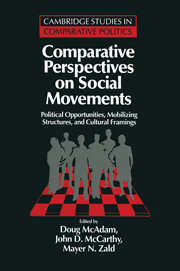 Comparative Perspectives on Social Movements
Comparative Perspectives on Social Movements Book contents
- Frontmatter
- Contents
- Biographical sketches of contributors
- Preface
- Introduction: Opportunities, mobilizing structures, and framing processes – toward a synthetic, comparative perspective on social movements
- PART I POLITICAL OPPORTUNITIES
- PART II MOBILIZING STRUCTURES
- PART III FRAMING PROCESSES
- 11 Culture, ideology, and strategic framing
- 12 Framing political opportunity
- 13 Accessing public, media, electoral, and governmental agendas
- 14 Media discourse, movement publicity, and the generation of collective action frames: Theoretical and empirical exercises in meaning construction
- 15 The framing function of movement tactics: Strategic dramaturgy in the American civil rights movement
- Notes
- References
- Index
11 - Culture, ideology, and strategic framing
Published online by Cambridge University Press: 05 June 2012
- Frontmatter
- Contents
- Biographical sketches of contributors
- Preface
- Introduction: Opportunities, mobilizing structures, and framing processes – toward a synthetic, comparative perspective on social movements
- PART I POLITICAL OPPORTUNITIES
- PART II MOBILIZING STRUCTURES
- PART III FRAMING PROCESSES
- 11 Culture, ideology, and strategic framing
- 12 Framing political opportunity
- 13 Accessing public, media, electoral, and governmental agendas
- 14 Media discourse, movement publicity, and the generation of collective action frames: Theoretical and empirical exercises in meaning construction
- 15 The framing function of movement tactics: Strategic dramaturgy in the American civil rights movement
- Notes
- References
- Index
Summary
The recent focus on the strategic framing of injustice and grievances, their causes, motivations, and associated templates for collective action, has served to reemphasize the central importance of ideas and cultural elements in understanding the mobilization of participation in social movements and the framing of political opportunity. While conceiving of culture and framing as strategically produced represents a substantial break with past conceptions of ideas in movements, which tended to emphasize their embeddedness in community and as crescively emergent, still the notion of strategic framing is quite vague in terms of its constituent elements and general processes. This introduction to Part III focuses first on the larger evolution of the analysis of ideas and culture in academic scholarship and as it was entailed (or not) in the study of social movements. Recent decades have seen the emergence of modes of analysis of culture, of frames and scripts, of rhetoric and dramaturgy, and of cultural repertoires and tool kits that substantially enhance our ability to analyze the role of culture, ideology, and frames in social movements. The literature on culture and framing in social movements has been somewhat amorphous. I sketch six basic topics in the interplay of movements, framing, and the larger society. First, I discuss the cultural construction of repertoires of contention and frames. Second, since framing takes place in the context of larger societal processes, I discuss the contribution of cultural contradictions and historical events in providing opportunities for framing.
- Type
- Chapter
- Information
- Comparative Perspectives on Social MovementsPolitical Opportunities, Mobilizing Structures, and Cultural Framings, pp. 261 - 274Publisher: Cambridge University PressPrint publication year: 1996
- 201
- Cited by


